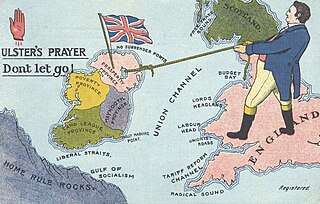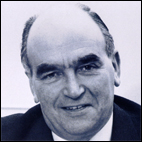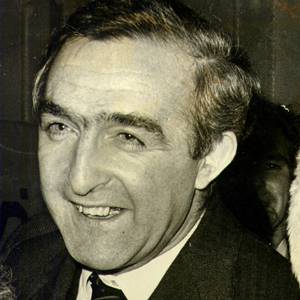
The Ulster Unionist Party (UUP) is a unionist and conservative political party in Northern Ireland. Having gathered support in Ulster, the northern province in Ireland, during the late-nineteenth and early-twentieth centuries, the party governed Northern Ireland between 1921 and 1972. The UUP and its predecessors have been the traditional Unionist voice in Ireland. It was supported by most unionist voters throughout the conflict known as the Troubles, during which time it was often referred to as the Official Unionist Party (OUP). Between 1905 and 1972, its peers and MPs took the Conservative whip at Westminster, in effect functioning as the Northern Irish branch of the Conservative and Unionist Party. This arrangement came to an end in 1972 over disagreements over the Sunningdale Agreement. The two parties have remained institutionally separate ever since, with the exception of the 2009–2012 Ulster Conservatives and Unionists electoral alliance.

Unionism in Ireland is a political tradition on the island that professes loyalty to the Crown and constitution of the United Kingdom. Once the overwhelming sentiment of a then-ascendant minority Protestant population, in the decades following Catholic Emancipation (1829) it mobilised to oppose the restoration of an Irish parliament. In the century since Partition (1921), as Ulster Unionism its commitment has been to the retention within the United Kingdom of the six Ulster counties that constitute Northern Ireland. Within the framework of a peace settlement for Northern Ireland, since 1998 unionists have had to accommodate Irish nationalists in a devolved administration, while continuing to rely on the connection with Great Britain to secure their cultural and economic interests.

Terence Marne O'Neill, Baron O'Neill of the Maine, PC (NI), was the fourth prime minister of Northern Ireland and leader (1963–1969) of the Ulster Unionist Party (UUP). A moderate unionist, who sought to reconcile the sectarian divisions in Northern Ireland society, he was a member of the Parliament of Northern Ireland for the Bannside constituency from 1946 until his resignation in January 1970; his successor in the House of Commons of Northern Ireland was Ian Paisley, while control of the UUP also passed to more hard-line elements.
Arthur Brian Deane Faulkner, Baron Faulkner of Downpatrick,, was the sixth and last Prime Minister of Northern Ireland, from March 1971 until his resignation in March 1972. He was also the chief executive of the short-lived Northern Ireland Executive during the first half of 1974.

James Dawson Chichester-Clark, Baron Moyola, PC, DL was the penultimate Prime Minister of Northern Ireland and eighth leader of the Ulster Unionist Party between 1969 and March 1971. He was Member of the Northern Ireland Parliament for South Londonderry for 12 years, beginning at the by-election to replace his grandmother Dehra Parker in 1960. He stopped being an MP when the Stormont Parliament was suspended and subsequently abolished with the introduction of Direct Rule by the British Government.

Basil Stanlake Brooke, 1st Viscount Brookeborough,, styled Sir Basil Brooke, 5th Baronet between 1907 and 1952, was an Ulster Unionist Party (UUP) politician who became the third Prime Minister of Northern Ireland in May 1943, holding office until March 1963.

The Vanguard Unionist Progressive Party (VUPP), informally known as Ulster Vanguard, was a unionist political party which existed in Northern Ireland between 1972 and 1978. Led by William Craig, the party emerged from a split in the Ulster Unionist Party (UUP) and was closely affiliated with several loyalist paramilitary groups. The party was set up in opposition to power sharing with Irish nationalist parties. It opposed the Sunningdale Agreement and was involved in extra-parliamentary activity against the agreement. However, in 1975, during discussions on the constitutional status of Northern Ireland in the constitutional convention, William Craig suggested the possibility of voluntary power sharing with the nationalist Social Democratic and Labour Party. In consequence the party split, with dissenters forming the United Ulster Unionist Party. Thereafter Vanguard declined and following poor results in the 1977 local government elections, Craig merged the remainder of Vanguard into the UUP in February 1978.

William "Bill" Craig was a Northern Irish politician best known for forming the Unionist Vanguard movement.
Anne Letitia Dickson CBE is a former Northern Ireland Unionist politician.
John Warden Brooke, 2nd Viscount Brookeborough, PC (NI) was a Northern Irish politician. He was the son of Basil Brooke, 1st Viscount Brookeborough, third Prime Minister of Northern Ireland.

Henry William West was a politician in Northern Ireland who served as leader of the Ulster Unionist Party from 1974 until 1979.

Desmond Norman Orr Boal was a unionist politician and barrister from Northern Ireland.
Sir John Lawson Ormrod Andrews was a member of both the Northern Ireland House of Commons and the Senate of Northern Ireland.
Henry Cassidy Midgley, PC (NI), known as Harry Midgley was a prominent trade-unionist and politician in Northern Ireland. Born to a working-class Protestant family in Tiger's Bay, north Belfast, he followed his father into the shipyard. After serving on the Western Front in the Great War, he became an official in a textile workers union and a leading light in the Belfast Labour Party (BLP). He represented the party's efforts in the early 1920s to provide a left opposition to the Unionist government of the new Northern Ireland while remaining non-committal on the divisive question of Irish partition.
The 1971 Ulster Unionist Party leadership election was caused by the resignation of James Chichester-Clark, after he had failed to persuade the British Government to provide his government with more resources to quell the growing civil unrest.
William Joseph Long OBE was a Unionist politician in Northern Ireland.
The Rt Hon. Robin John Bailie, PC (NI), is a Northern Irish solicitor and former politician.

The February 1974 United Kingdom general election in Northern Ireland was held on 28 February with 12 MPs elected in single-seat constituencies using first-past-the-post as part of the wider general election in the United Kingdom.

The October 1974 United Kingdom general election in Northern Ireland was held on 10 October with 12 MPs elected in single-seat constituencies using first-past-the-post as part of the wider general election in the United Kingdom.











